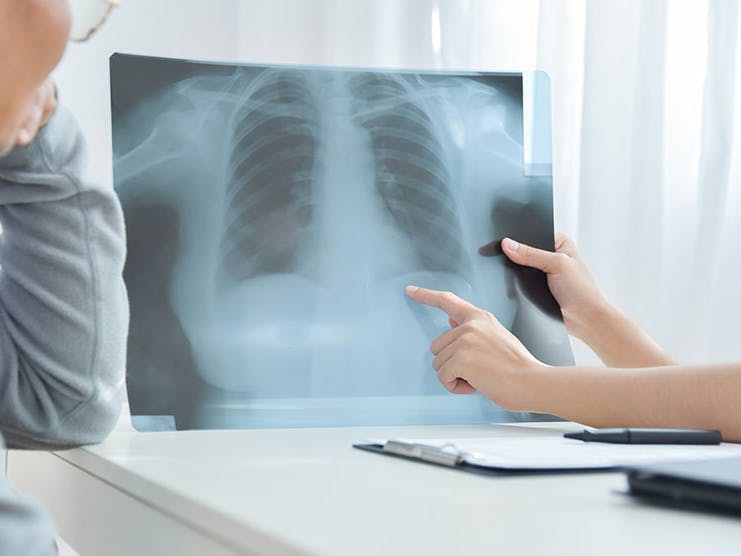
We all know it by now — smoking cigarettes is among the worst habits for your health. But, even knowing this, kicking butts is still a tough thing to do.
First, some facts to help you get motivated: According to the CDC, more than 16 million Americans live with smoking-related diseases, including cancer, heart disease, stroke, lung diseases, diabetes, emphysema, and chronic bronchitis. And cigarette smoking is the number one risk factor for lung cancer. But there is hope. Stopping smoking at any age will improve — both immediately and over time — your physical health, along with your mental health and wellbeing. The effect of quitting on lung cancer risk is especially dramatic.
“Even if you have a history of smoking, quitting at any age can reduce your lung cancer risk,” Dr. Cherie P. Erkmen, a thoracic surgeon and director of the lung cancer screening program at Temple University Hospital, told Eat This, Not That. In fact, she says, 15 years after quitting, your odds of getting lung cancer drop to about the same as someone who never smoked!
Some people quit cold turkey, while others follow a gradual regimen to stop smoking. There’s no one way to succeed, but there are some tried-and-true tips that do seem to help.
Nine tips to help you quit smoking
So you’ve decided it’s time to kick smoking to the curb once and for all. Now what? Here are some tips to help you quit.
1. Write down your reasons for quitting
Putting your reasons into words will help keep you focused on your goal.
2. Get support from family and friends
Loved ones’ support and encouragement can be just the medicine you need to keep going. Support groups and counseling, either in person or online, can also be effective.
3. Have a plan if you’re tempted to smoke
Be prepared with an alternate activity when you feel the urge strike.
4. List your smoking triggers and figure out how to avoid them (at least temporarily)
Try to steer clear of the places and activities you associate with lighting up.
5. Consider nicotine replacement therapy
Nicotine withdrawal can cause headaches, irritability, and lack of energy. Nicotine gum, lozenges, and patches can improve your chances of success.
6. Learn about available medication
Prescription medication like Chantix and Zyban can help curb your cravings. Ask your doctor for more information.
7. Clean house
Once you’ve decided to quit, get rid of the ashtrays and lighters, and clean the couches, drapes, and carpets. Having a fresh smelling house may make you think twice before lighting up again.
8. Exercise
Physical activity has been shown to curb withdrawal symptoms, even if it’s just getting out for a walk or working in the garden. So get moving!
9. Treat yourself
Now that you’ve saved all that money from not buying cigarettes, reward yourself with something fun.
How can Medicare help you quit smoking?
Medicare considers smoking cessation as preventive care and provides benefits to help.
Medicare covers up to two quitting attempts each year, and each attempt includes four counseling sessions. These sessions can be either in person or over the phone and can include group sessions as well as individual counseling. In counseling, you and a licensed doctor or therapist will explore many aspects of your smoking addiction, along with the steps you should take on your journey to a smoke-free life.
Your doctor may prescribe Chantix or Zyban, both of which can help you quit by reducing your urge to smoke. If you have Medicare Part D for prescription medications, it will cover the cost of these drugs. Over-the-counter products, like nicotine patches and gum, are not covered by Original Medicare, although you may find some coverage under certain Medicare Advantage plans.
Additional sources
Does Medicare Cover Lung Cancer Screening?
Internal Web Link
Does Medicare Cover Nicotine Patches?
Internal Web Link
5 Sneaky Habits that May Spike Your Blood Pressure
Internal Web Link
Are Portable Oxygen Concentrators Covered by Medicare?
Internal Web Link
Great American Smokeout
External Web Link


